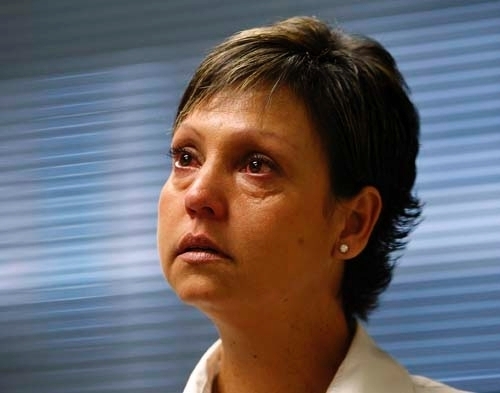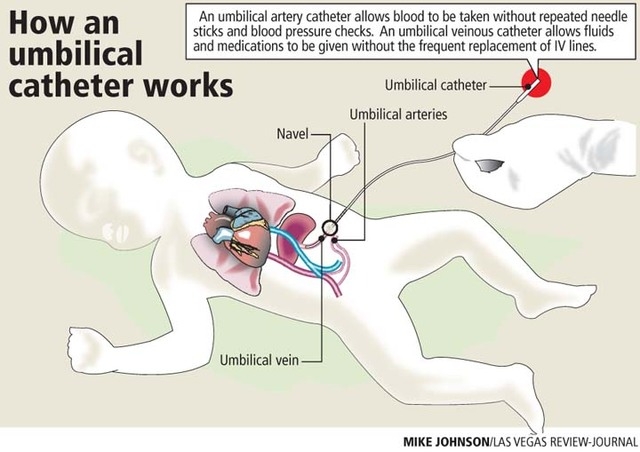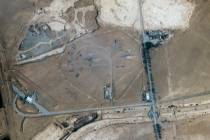Ex-Sunrise nurses won’t face prosecution in infant’s death
Two former Sunrise Hospital nurses fired in connection with the July 2, 2010, death of 2-month-old Miowne Obote will not be prosecuted and police have closed the case, according to court documents.
“I was driving when I got the news, and I had to pull my car over,” one of the nurses, Sharon Ochoa-Reyes, said Tuesday. “I just started crying. A great injustice had been done. They used us as a scapegoat for problems they had with a product. … You can’t imagine what it’s like to have someone think you’ve killed a baby. … It was so hard on my family. … Corporations don’t care about doing an injustice to employees.”
“I’m so relieved. This has been a long time coming,” nurse Jessica Rice said.
Tuesday’s disclosure surfaced in a civil case brought against police by Ochoa-Reyes and Rice, who wanted police to release copies of Sunrise Hospital documents pertaining to their firing.
In the Metropolitan Police Department’s Oct. 11 response, the department’s assistant general counsel, Charlotte Bible, wrote that she was notified on Oct. 14 that the district attorney would not prosecute the case and, “as a result, LVMPD’s case would be closed.”
That statement brought an email from Sunrise spokesman Brendan Bussmann: “Sunrise Hospital and Medical Center respects the investigative work of the Metropolitan Police Department, and the challenge for the district attorney in predicting whether the evidence proves guilt beyond a reasonable doubt.”
Clark County Coroner Mike Murphy ruled Baby Obote’s death a homicide after the infant’s catheter was found severed. Criminologists speculated as to whether the nurses associated with Obote could be “angels of death,” nurses who say they kill patients out of mercy.
Both nurses had been called “persons of interest” by Las Vegas police — asked by Sunrise officials to investigate the baby’s death — as authorities looked into how catheters came apart in the intensive care unit for children.
Catheters are used to draw blood and deliver nutrition and medication.
Murphy later said his investigators never examined the catheters to reach a determination of homicide, instead basing a conclusion on the analysis of an expert Sunrise hired.
But that expert, W. Donn Buhn, said in 2010 that product failure could not be ruled out and that Sunrise officials never asked him to test for product failures.
In July 2010, Sunrise officials said they asked police to investigate 14 incidents of “disrupted catheters” that tracked back to February of that year. One child needed emergency surgery, and another was in critical condition; Baby Obote died while the other child survived.
Ochoa-Reyes, employed at the hospital for 19 years, said in November 2010 that nurses in the neonatal intensive care unit had been having problems with catheters breaking for months.
“The hospital administration basically paid no real attention to it until babies got hurt,” she said.
Ochoa-Reyes’ attorney George Kelesis argued in a lawsuit for wrongful termination and defamation that Sunrise hospital officials had been looking for a “scapegoat” for a long-standing and dangerous problem with the catheters.
Rice’s attorney, Kathleen Murphy-Jones, also filed a lawsuit against Sunrise. She charged that police sent the catheters to a forensic lab and, in spring 2011, analysis showed none of the catheter lines had been cut and “there was evidence of product defect and/or failure.”
Murphy-Jones said Tuesday she is optimistic that information will be in files police said they will release at the end of the month.
National safety experts said if hospital officials had acted earlier to determine why at least a dozen catheter lines frequently separated, one child might not have had to endure a lifesaving operation and another might not have died.
“This is a failure of hospital leadership,” Debora Simmons, head of the Houston-based National Center for Cognitive Informatics and Decision Making in Healthcare, said in 2010.
Sylvia Young, CEO of Sunrise, an HCA hospital, at the time of the catheter problems, has been promoted to president of HCA’s Continental Division.
Ochoa-Reyes, who got a nursing job outside of a hospital, said Tuesday she might take a job at Sunrise if she is offered one.
Last month, U.S. District Court Judge Gloria Navarro ordered Sunrise officials to follow rulings by federal arbitrators which called for the nurses’ reinstatement with back pay.
Navarro also ruled that the hospital must pay attorneys’ fees.
“I loved that job,” Ochoa-Reyes said. “If I do go back, I’m doing this not just for me, but for other nurses, to show that we can’t be pushed around. And if I go back, I’ll go with my head held high. I did nothing wrong.”






























